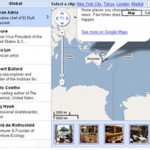 San Francisco — Microsoft Corp.’s recently launched Bing search engine, has witnessed an 8 percent growth in unique users since its June 2009 launch, swallowing a bout of market share at the expense of Yahoo! Inc. rather than Google Inc., research firm comScore Inc. said.
San Francisco — Microsoft Corp.’s recently launched Bing search engine, has witnessed an 8 percent growth in unique users since its June 2009 launch, swallowing a bout of market share at the expense of Yahoo! Inc. rather than Google Inc., research firm comScore Inc. said.
The Bing homepage image changes every day and now includes localized UK “hotspot” links.
According to Microsoft, the number of people flocked to Bing in June for online searches was eight percent higher than that of its predecessor, MSN Live, during the same period last year, and the number of people likely to recommend the site has doubled too, the company said.

Meanwhile, figures released in recent weeks by industry analytics firms show mixed data, leaving it unclear whether Bing is doing much to close the gaps with Yahoo! and Internet search king Google. Microsoft’s share of U.S. searches rose to 8.4 percent in June from 8 percent in May, according to Reston, Virginia-based comScore. Yahoo ranked second, dropping to 19.6 percent from 20.1 percent. Google maintained its dominance, accounting for 65 percent of searches, unchanged from May.
“This is an important metric to us because we think it speaks of Bing’s ability to meet your needs, be they for general purpose searching or for searches to help you make smarter decisions in one or more of our four focus areas of shopping, travel, health and local,” Yusuf Mehdi, senior vice president of the online audience business group at Microsoft, wrote in a blog post.
However, according to figures quoted from Compete, an external ratings service, reports that Bing’s gain for Microsoft during June was minimal. Its market share was up from 6.2 per cent in May 2009 to 6.5 per cent — an increase of 0.3 per cent.
Moreover, Compete’s data depicts Bing has not even appears to have caused any dent in Google’s share of the search market, which also continued to rise in the same month by 0.6 per cent, from 73 per cent to 73.9 per cent.
Nevertheless, Yahoo! remains stagnant as the second most popular search engine with about 16 percent of the US market, and Bing is third with 6.5 percent, according to Compete.
Other Internet-tracking firms report different figures, with the ranking remaining constant but conflicts emerging as to whether Bing is gaining, holding, or losing ground.
“It is really too early to tell how Bing is doing; the numbers are really mixed,” said Danny Sullivan, editor-in-chief at SearchEngineLand.com, a website devoted to developments in the industry.
Microsoft also is reportedly spending 80 to 100 million dollars marketing Bing but has not publicly disclosed its promotional budget.
“We are pleased to report that there has been some great interest in trying out Bing and that those experiences are yielding positive results,” Mehdi said in an online posting.
“It has been a busy month, but we are just getting started. We have a long term view, and we are committed to steady progress over the years to come.” June is the first full month the Bing “decision engine” has been live.
According to some experts, Bing is more likely to lure users away from Yahoo! than Google, which is woven into people’s lives so thoroughly that the company’s name is used as a verb to express the act of searching the Internet.
“The next big goal for Bing is not to beat Google, but to beat Yahoo!,” Sullivan said. “If they cannot get to number two, then getting past there is much harder.”
Bing has yet to captivate as much of the market globally, with 3.27 percent of worldwide market share in June, behind Google with 89.8 percent and Yahoo with 5.15 percent.


